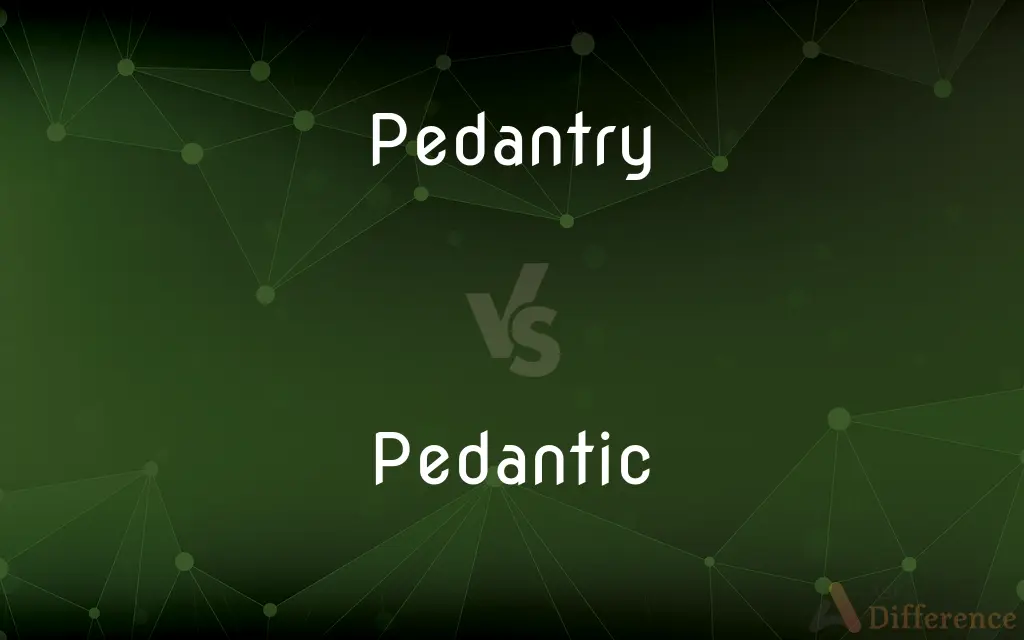Pedantry vs. Pedantic — What's the Difference?
By Fiza Rafique & Maham Liaqat — Updated on March 25, 2024
Pedantry involves an overly concerned attitude with minor details and rules, while pedantic describes someone exhibiting this behavior.

Difference Between Pedantry and Pedantic
Table of Contents
ADVERTISEMENT
Key Differences
Pedantry refers to the behavior or practice of paying too much attention to formal rules or small details, often missing the larger purpose or context. Pedantic is an adjective used to describe a person, their behavior, or their attitude when they are being overly concerned with minor details or formalisms, often in a showy or unnecessary manner.
The key difference lies in the fact that pedantry is the noun form, referring to the behavior or practice itself, while pedantic is the adjective that describes the characteristic of a person or their actions. Both terms carry a somewhat negative connotation, suggesting an excessive concern with trivialities at the expense of understanding or appreciating larger issues.
Pedantry often arises in academic, literary, or scholarly contexts, where adherence to specific rules and details is emphasized. However, when taken to an extreme, it becomes a point of criticism. On the other hand, calling someone pedantic usually points out that their focus on details is unnecessary or detracting from the main point.
It's worth noting that both terms can be applied more broadly than just academic or scholarly contexts. They can describe behavior in any area where there is an overemphasis on formality or precision that is seen as excessive or unnecessary.
Comparison Chart
Definition
The behavior or practice of being overly concerned with minor details or rules
Describing a person or behavior that is overly concerned with minor details or rules
ADVERTISEMENT
Nature
Noun
Adjective
Connotation
Generally negative, implies excessive concern with trivialities
Negative, used to describe someone showing excessive concern with trivialities
Usage Context
Refers to the act or behavior itself
Used to describe the characteristic of a person or their actions
Examples
Engaging in pedantry can alienate others
His pedantic insistence on following every rule to the letter was frustrating
Compare with Definitions
Pedantry
A tendency to focus on trivial points in teaching or learning.
The teacher's pedantry lost the students' interest.
Pedantic
Showing an ostentatious concern for academic knowledge.
The pedantic professor insisted on using the most technical language possible.
Pedantry
Overemphasis on formalities or traditional rules.
Her pedantry in enforcing outdated etiquette frustrated the new team members.
Pedantic
Overly concerned with formal rules and small details.
His pedantic approach to cooking took the joy out of the meal.
Pedantry
Behavior that prioritizes form over substance.
The novelist criticized the literary critic's pedantry as missing the emotional core of his work.
Pedantic
Inclined to make a show of one's knowledge, often in a tedious manner.
Her pedantic speeches were filled with unnecessary jargon.
Pedantry
The practice of ostentatiously displaying academic knowledge.
His pedantry was evident when he corrected the pronunciation of every foreign term.
Pedantic
Marked by a narrow focus on trivial aspects of learning.
The pedantic writer alienated readers with dense footnotes.
Pedantry
Excessive concern with minor details and rules.
The committee's pedantry over the event details delayed the project.
Pedantic
Demonstrating an excessive emphasis on precision.
His pedantic editing overlooked the narrative's flow.
Pedantry
Excessive concern with minor details and rules
To object to this is not mere pedantry
Pedantic
Excessively concerned with minor details or rules; overscrupulous
His analyses are careful and even painstaking, but never pedantic
Pedantry
The ostentatious display of academic knowledge, or undue attention paid to minor details or formal rules
His detailed research was dismissed as pedantry.
Pedantic
Characterized by a narrow, often ostentatious concern for academic knowledge and formal rules
A pedantic attention to details.
Pedantry
An instance of pedantic behavior
Grew tired of his pedantries.
Pedantic
Being overly concerned with formal rules and trivial points of learning, like a pedant.
Pedantry
An excessive attention to detail or rules.
Pedantic
Being showy of one’s knowledge, often in a boring manner.
Pedantry
An instance of such behaviour.
I don’t want to listen to your pedantries anymore.
Pedantic
Of or pertaining to a pedant; characteristic of, or resembling, a pedant; ostentatious of learning; as, a pedantic writer; a pedantic description; a pedantical affectation.
Pedantry
An overly ambitious display of learning.
Pedantic
Marked by a narrow focus on or display of learning especially its trivial aspects
Pedantry
The act, character, or manners of a pedant; vain ostentation of learning.
'T is a practice that savors much of pedantry.
Pedantry
A ostentatious and inappropriate display of learning
Common Curiosities
Is being pedantic always a negative trait?
While often viewed negatively, being pedantic can sometimes ensure accuracy and thoroughness in specific contexts.
Can pedantry be useful?
In some professions or tasks, attention to detail is crucial, making what might be seen as pedantry actually valuable.
How can one avoid pedantry or being pedantic?
Focusing on the main ideas and not overemphasizing minor details can help avoid these traits.
How is pedantic behavior perceived in professional settings?
It can be both a strength and a weakness, depending on whether the focus on details enhances or hinders the overall objectives.
Can a person be pedantic in one area but not in others?
Yes, someone might display pedantic behavior in areas where they have expertise or particular interest, but not generally.
Are pedantry and being pedantic exclusive to academic fields?
No, these behaviors can occur in any area of life where there is a focus on details or formalisms.
Does culture influence perceptions of pedantry and pedantic behavior?
Cultural norms and values can affect how these traits are viewed, with some cultures placing higher value on detail and precision.
Is pedantry the same as perfectionism?
While they share similarities in attention to detail, perfectionism is broader, encompassing a drive for flawlessness beyond just knowledge or rules.
Can pedantic behavior change over time?
Yes, individuals may become more or less pedantic as they gain experience or perspective.
How do pedantry and being pedantic relate to learning styles?
They may reflect a preference for structured, rule-based learning over more holistic or conceptual approaches.
Share Your Discovery

Previous Comparison
Kind vs. Gracious
Next Comparison
Invertor vs. InverterAuthor Spotlight
Written by
Fiza RafiqueFiza Rafique is a skilled content writer at AskDifference.com, where she meticulously refines and enhances written pieces. Drawing from her vast editorial expertise, Fiza ensures clarity, accuracy, and precision in every article. Passionate about language, she continually seeks to elevate the quality of content for readers worldwide.
Co-written by
Maham Liaqat













































